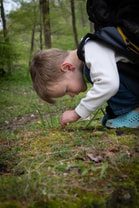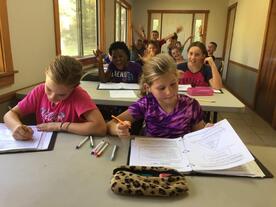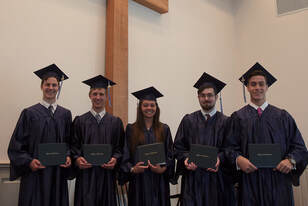ALC’s Educational Paradigm
Overview
ALC is modeled after the classical trivium model which was popular during the Middle Ages and contributed to the emergence of the Renaissance and is returning in popularity again especially among Christian schools. But popularity is not what drove the decision to model our school after this paradigm: it was chosen because it makes sense. The trivium is based off of three natural periods of growth which a student undergoes from childhood through adulthood. While each child develops at slightly different rates, the general periods are Grammar, Logic, and Rhetoric.
Grammar, which author and philosopher Dorothy Sayers referred to as the "poll-parrot" stage, aligns with those years in which everything seems to stick in the child's mind. These are crucially formative years to fill their sponge-like minds with not only useful factual information, but also with a taste for the good and the beautiful which will inform their thoughts for the rest of their lives.
Logic, or the "pert stage" in Sayers' estimation, are those years when the child begins to seriously question facts and opinions as opposed to simply memorizing them. For the untrained child, these new thoughts and deductive abilities can appear to his parents as impertinent or argumentative. But for the trained child, these years are a hothouse in forming the abilities to think well for himself and concentrate his thoughts on matters of real import.
Rhetoric, or the "poet stage", is when the child begins to learn how to take his thoughts, gather and organize them into a sensible framework, and to present them both persuasively and beautifully to a listening ear. It is essential training for continued higher education or a capstone to the liberal arts training as the student is finally equipped to enter the work force.
As one thinker put it, the trivium is a very sensible picture of learning itself being as the three stages - Grammar, Logic, Rhetoric - correspond well with the developmental skills of listening, thinking, and speaking.
Grammar, which author and philosopher Dorothy Sayers referred to as the "poll-parrot" stage, aligns with those years in which everything seems to stick in the child's mind. These are crucially formative years to fill their sponge-like minds with not only useful factual information, but also with a taste for the good and the beautiful which will inform their thoughts for the rest of their lives.
Logic, or the "pert stage" in Sayers' estimation, are those years when the child begins to seriously question facts and opinions as opposed to simply memorizing them. For the untrained child, these new thoughts and deductive abilities can appear to his parents as impertinent or argumentative. But for the trained child, these years are a hothouse in forming the abilities to think well for himself and concentrate his thoughts on matters of real import.
Rhetoric, or the "poet stage", is when the child begins to learn how to take his thoughts, gather and organize them into a sensible framework, and to present them both persuasively and beautifully to a listening ear. It is essential training for continued higher education or a capstone to the liberal arts training as the student is finally equipped to enter the work force.
As one thinker put it, the trivium is a very sensible picture of learning itself being as the three stages - Grammar, Logic, Rhetoric - correspond well with the developmental skills of listening, thinking, and speaking.


